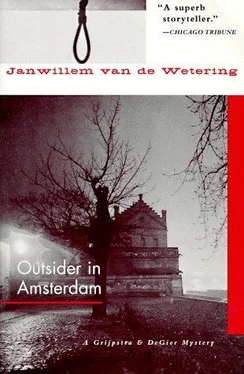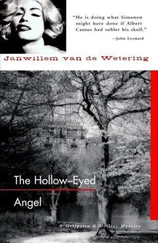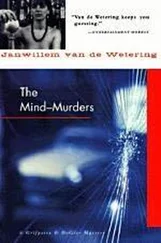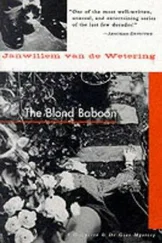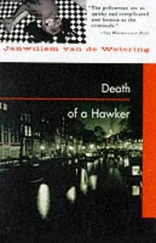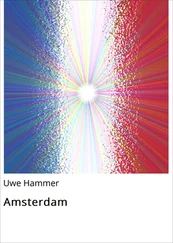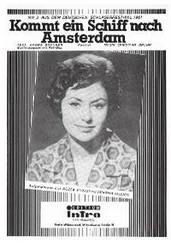Janwillem De Wetering - Outsider in Amsterdam
Здесь есть возможность читать онлайн «Janwillem De Wetering - Outsider in Amsterdam» весь текст электронной книги совершенно бесплатно (целиком полную версию без сокращений). В некоторых случаях можно слушать аудио, скачать через торрент в формате fb2 и присутствует краткое содержание. Жанр: Полицейский детектив, на английском языке. Описание произведения, (предисловие) а так же отзывы посетителей доступны на портале библиотеки ЛибКат.
- Название:Outsider in Amsterdam
- Автор:
- Жанр:
- Год:неизвестен
- ISBN:нет данных
- Рейтинг книги:4 / 5. Голосов: 1
-
Избранное:Добавить в избранное
- Отзывы:
-
Ваша оценка:
- 80
- 1
- 2
- 3
- 4
- 5
Outsider in Amsterdam: краткое содержание, описание и аннотация
Предлагаем к чтению аннотацию, описание, краткое содержание или предисловие (зависит от того, что написал сам автор книги «Outsider in Amsterdam»). Если вы не нашли необходимую информацию о книге — напишите в комментариях, мы постараемся отыскать её.
Outsider in Amsterdam — читать онлайн бесплатно полную книгу (весь текст) целиком
Ниже представлен текст книги, разбитый по страницам. Система сохранения места последней прочитанной страницы, позволяет с удобством читать онлайн бесплатно книгу «Outsider in Amsterdam», без необходимости каждый раз заново искать на чём Вы остановились. Поставьте закладку, и сможете в любой момент перейти на страницу, на которой закончили чтение.
Интервал:
Закладка:
De Gier studied the lonely pedestrian on the sidewalk on the other side of the street. He had recognized the chief inspector, dressed in an old worn duffelcoat and talking to his Alsatian, a young dog that by wagging his tail and barking, was asking to be released from his leash. De Gier looked at the chief inspector with admiration. The chief inspector shuffled along, dragging his feet, and seemed some twenty years older than his real age.
"You see that fellow over there?" he whispered to the detective next to him.
The detective looked.
"I see him. The old chappie with his dog. There was another man some minutes ago, with two dachshunds. Anything the matter with him?"
"That's the chief inspector," de Gier whispered.
The detective looked again.
"You are right. What's with his hair? Is he wearing a wig?"
"No," de Gier said. "Why would he be wearing a wig?"
"He looks different," the detective whispered.
De Gier produced a small pair of binoculars, his private property for which he had paid a lot of money once. The chief inspector's hair did appear different, curly, not slicked down with fat as it usually was.
"Must have washed and ruffled his hair," de Gier thought. "Very effective. Goes with the old duffelcoat and the shuffling gait. He looks like one of the old unemployed characters who live around here, by themselves mostly. Misfits, drunks, potential suicides."
He looked at his watch again, five to nine. Van Met-eren had arrived and was waiting near the front door of number 5, leaning against the wall. The chief inspector had allowed the Alsatian to drag him away. Around the corner an old car should be parked with two detectives in the front seat, and two uniformed constables were supposed to patrol the Haarlemmer Street. The Haarlemmer Street is regularly patrolled by cops on foot so de Kater, if he would be coming through there, shouldn't be unduly suspicious. They might catch him later though, should de Kater, in a panic, want to escape through the back of the house in the Haarlemmer Houttuinen, for the two streets are parallel and the gardens connect.
And then there was Grijpstra, of course, hidden in the courtyard of the house, together with a young burly detective who could walk up a gable and who had shown them a diploma from a mountain club to prove it. They had tried to think of everything.
The detective put his hand on de Gier's arm. "Is that our man?"
Joachim de Kater had appeared, striding along energetically, carrying an obviously empty suitcase and twirling an umbrella. He waved at van Meteren and the two started talking to each other. They seemed to agree after a while and de Kater opened the front door with his key. The door opened, and closed. The street became quiet again. The chief-inspector's Alsatian lifted his leg and pissed against a lamp post. The chief inspector waited patiently for the dog to finish.
"And now?" the detective whispered.
"Quiet," de Gier snapped.
De Gier tried to imagine what was happening inside the house. The heroin was hidden in the Buddha statue that throned in the corridor, the cheap copy that Piet Verboom had once bought in the Paris flea market. De Gier knew now, because van Meteren had explained it to him, that the statue was hollow. Metal statues, even if they are hollow, cannot usually be opened and the detectives who had searched the house hadn't thought of forcing the Buddha's head off the body.
De Kater had become the rightful owner of the house and its contents. According to Constanze he had inserted a clause into the contract that stated that anything in the house, whether furniture, ornament or whatever, came with the house. The statue was his, and the heroin inside the statue was his as well, but he hadn't known that the heroin was inside the statue.
De Gier sighed. He had thought about the statues when Constanze had been telling him about the sale of the house. He sighed again, thinking of Constanze's body and of the long leg that she had put on top of his own. He thought of the firm warm breasts and the soft slightly hoarse voice. And now he was here, squatting under a bush, with a branch scratching his neck and dog shit all around, and next to a bad-tempered detective.
He might have deduced that the Buddha statue was hollow but he had only thought of the sudden popularity of Eastern religions that would influence the price of the statue. He had thought that Piet Verboom and Joachim de Kater were clever people and that buying at the right time and selling at the right time seemed a more intelligent way of filling one's time man the detection of crimes. The original of the statue, according to Constanze, stood in a temple in Ceylon. A famous statue, several times stolen and returned again, and often copied. All the copies would be hollow, de Gier thought. Saves bronze and bronze is an expensive metal. Piet had discovered the hollowness of the statue when he studied its head, which hadn't been screwed on properly. A plumber had unscrewed the head, using a special oil and as little force as possible and the statue had been cleaned out and become a container. A container of the powder that leads the user straight to heaven. But a very temporary heaven and after a short while the user drops through a hole in its floor, straight into hell, and eventually the hell becomes permanent.
De Kater would now be standing next to the statue, impatiently waiting for van Meteren who would be giving him the small sealed bags, one by one, carefully of course, for he was handling very special merchandise. And the bags would be going into de Kater's suitcase. But they wouldn't stay there. Their contents could find their way into the blood of some of the young people of Amsterdam, the blood of simpletons, looking for higher spheres.
"But not this time," de Gier thought, and felt a wave of contentment. The feeling surprised him.
"Careful now," de Gier thought. His leg hurt because of a muscle knotting itself into a hard ball. He massaged the leg. "Easy now, soon you will be a dedicated police sergeant, motivated, complete. Complete with a sense of purpose."
He was muttering to himself.
"Pardon?" the detective asked.
"Nothing," de Gier said, "just stay put. We'll catch him when he leaves the house."
"Don't we want the black fellow?" the detective asked.
"We've got him already."
"An informer?"
"Sort of," de Gier said.
"He better watch it," the detective said, "if he shows himself as openly as that he won't last. We'll fish him out of the canal soon."
"Not him," de Gier said.
The door opened and de Kater became visible. He was holding on to the suitcase. It didn't seem heavy.
"Heroin is pretty light," the detective whispered. "If that suitcase is full he is carrying a hundred thousand guilders at least."
"Up," de Gier said.
"Now," de Gier shouted.
It was easy. De Gier, followed by his two assistants, sprinted across the road. There was no traffic. De Kater saw him and dropped the suitcase. He ran toward the old dented car and the two detectives opened the doors and rushed at him. De Kater turned and ran toward the chief inspector. He had dropped the umbrella as well. Nobody seemed very concerned about the pistol in de Kater's right hand. One of the detectives behind him fired, pointing his pistol at the moon. De Kater dropped his weapon and surrendered to the chief inspector and his dog who was showing his teeth and growling. The chief inspector hadn't moved, he had merely told de Kater to stop, in a pleasant voice.
"Some show," de Gier thought when he put his hand on the shoulder of the criminal. "Six men and one dog."
De Kater began to cry. Nobody was surprised. Suspects, at the moment of arrest, often cry. Fear, or a feeling of release, or both. Or shock perhaps.
Читать дальшеИнтервал:
Закладка:
Похожие книги на «Outsider in Amsterdam»
Представляем Вашему вниманию похожие книги на «Outsider in Amsterdam» списком для выбора. Мы отобрали схожую по названию и смыслу литературу в надежде предоставить читателям больше вариантов отыскать новые, интересные, ещё непрочитанные произведения.
Обсуждение, отзывы о книге «Outsider in Amsterdam» и просто собственные мнения читателей. Оставьте ваши комментарии, напишите, что Вы думаете о произведении, его смысле или главных героях. Укажите что конкретно понравилось, а что нет, и почему Вы так считаете.
